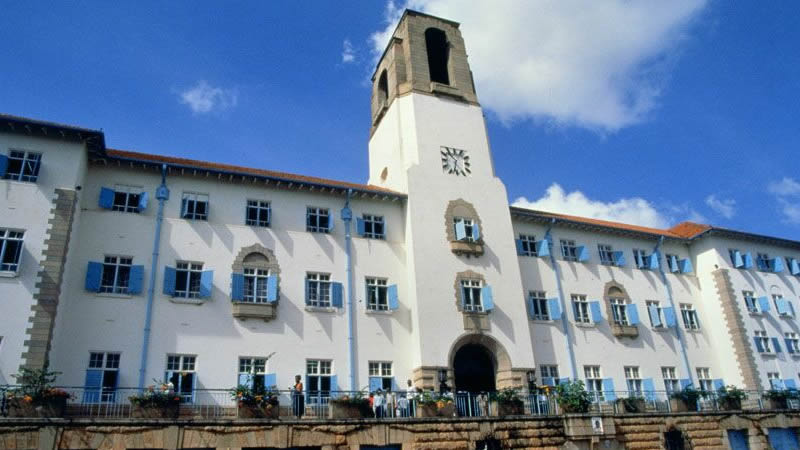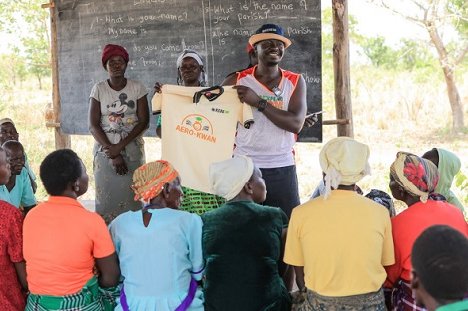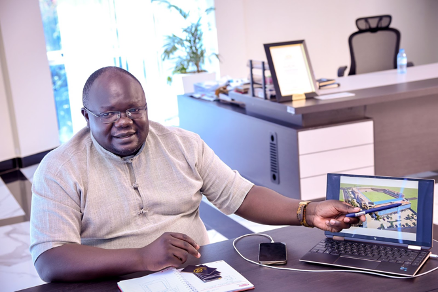By Jill Ainebyoona
Myres Ndyabawe is among 87 students who graduated with a Bachelor of Journalism and Communication at Makerere University, during the 71st graduation ceremony which happened in May 2021. Although he is proud of the degree he studied and graduating in the field of journalism, he now finds himself doing something rather different.
Currently, Ndyabawe spends most of his time in Kabuga Town Council, Kamwenge District, creating a mushroom-growing community project in Kabuga village, 12 km from Kamwenge town. This story started back in Kampala, on the hill in Makerere University.
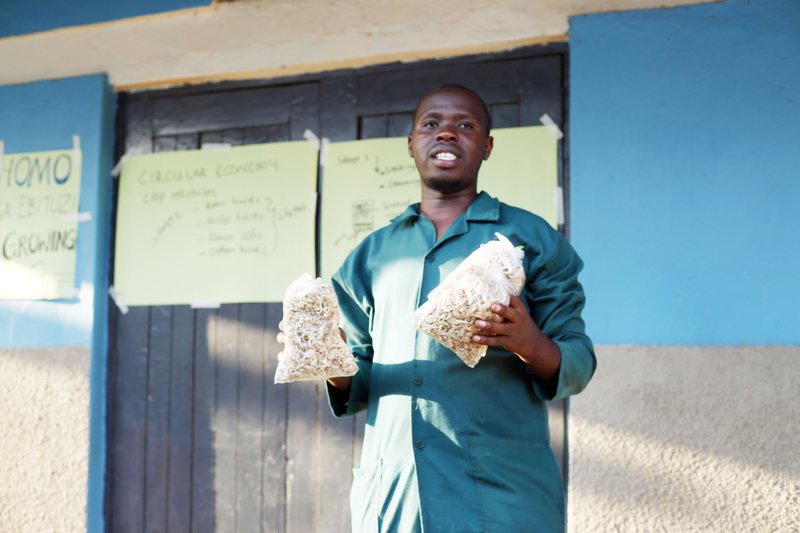
Myres Ndyabawe during one of the sessions on Mushroom Growing, with the people of Kabuga village, Kamwenge district
Support from MasterCard Foundation
While still at Makerere, Ndyabawe was part of the MasterCard Foundation Scholars Program, where he also served as the MasterCard Scholars’ Association president in 2018.
“At the programme, we underwent weekly psychosocial support training and financial management and entrepreneurship, which boosted my confidence, resilience and determination,” he says.
According to Ndyabawe, one of the core values of the MasterCard Scholars Program was giving back to the community, through which they were taught about solving community challenges through social entrepreneurship, as well as creating opportunities for themselves and the people around them.
The programme also offered all interested scholars an opportunity to participate in the Social Venture Challenge organised by the Resolution Project, through which those who emerged the best would win grants to implement their ideas.
“I participated in the challenge semi-finals in Johannesburg in 2017 but never advanced to the finals. I applied again in 2018 and won in Kigali which meant the start of my first social venture, Rabbits for Education, where we introduced rabbit farming to parents in Kamwenge district to boost their income, enabling them to support their children to stay in school,” says Ndyabawe.
He adds that his first venture supported 163 children before he handed it over to the community, and embarked on Simbula Ventures, which focuses on improving lives through mushroom growing in the same community.
Ndyabawe says the MasterCard Foundation also gave him seed capital for the launch of Simbula Ventures through the Scholars Entrepreneurship Fund.
He is proud of Makerere University for offering him an opportunity to network and make friends with constructive people who have proved supportive to date. Among these friends are Isaac Ndyamuhaki, a climate activist and team leader for Asili Kwanza, as well as a co-trainer at Simbula Ventures.
Ndyabawe, the team leader says they have embarked on mentoring communities on how to do cost-effective and environment-conscious mushroom growing, to curb poverty levels, and to approach the challenge of food scarcity.
Love for farming
When The Legacy newsletter paid him a visit in Kamwenge, he was starting a three-day free training on mushroom growing, with locals from Kabuga and nearby villages. Ndyabawe and Ndyamuhaki offered training to people in different locations, including Kabuga town council where they mentored over 60 participants.
Ndyabawe says he doesn’t regret practising agriculture even though he studied journalism, because it is also his calling.
He adds that mushrooms are among the easiest crops to grow, because they are not dependent on any weather condition. “Come rain, come shine, you will always grow mushrooms and harvest in only three weeks,” he says.
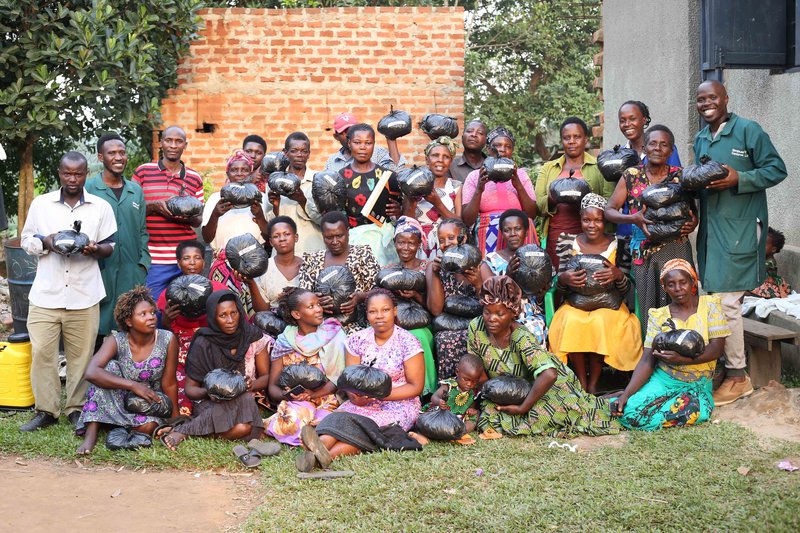
Myres Ndyabawe, (right), with some of the participants in the mushroom growing training on 8th August 2023
“Very little costs are incurred because most of what is needed can be accessed at no cost. It only takes three days of active work, which includes soaking on the first day, steaming on day two, and planting on day three. Then you wait for 14 days,” he says.
After harvesting, the market is readily available. In fact the mushroom growers cannot meet the demand of their products, which is 1,200 tonnes per year. They are only able to supply 500 tonnes, leaving a deficit of 700.
Ndyabawe dreams of seeing community trainees earn more than UgShs200,000 per harvest because there is a ready market where they can sell the produce, starting from the village, and beyond.
“The market is readily available. Even in Kampala in Nakasero Market, where a kilogramme of dried mushrooms is bought at UgShs6,000 at a wholesale price, but if you sell to an individual, it is sold at UgShs10,000-12,000,” says Ndyabawe.
Ndyamuhaki, says that at the local level, one can invest UgShs4,000 Uganda shillings to buy seedlings, which are spread over three plantations, but from those three plantations, one gets at least UgShs18,000 for every packet of seedlings, meaning that if you commit yourself and practice mushroom farming, there is more profit, alongside getting food for the home.
Testimonies from the locals
Provia Kemigisha, a resident of Karokarungi village says she will start growing mushrooms soon, to provide meals for her home and generate an income.
Apollo Byaruhanga, a resident of Kakinga says that he does not regret spending three days attending the mushroom growing training because he is going to create another income-generating avenue for raising school fees for the children.
Judith Kyomuhangi, the Women's Chairperson of Kabuga town council said that based on what she has learnt, she will start an initiative to train more women in mushroom farming, such that they don’t depend only on their husbands for financial sustainability.
Through the experiences and funding he has received from Makerere, Ndyabawe is truly giving back to the community.
Related News
![]() Please join hands with the Makerere University Endowment Fund as it works towards attracting & retaining the best faculty, providing scholarships, and investing in cutting-edge research and technology.
Please join hands with the Makerere University Endowment Fund as it works towards attracting & retaining the best faculty, providing scholarships, and investing in cutting-edge research and technology.
